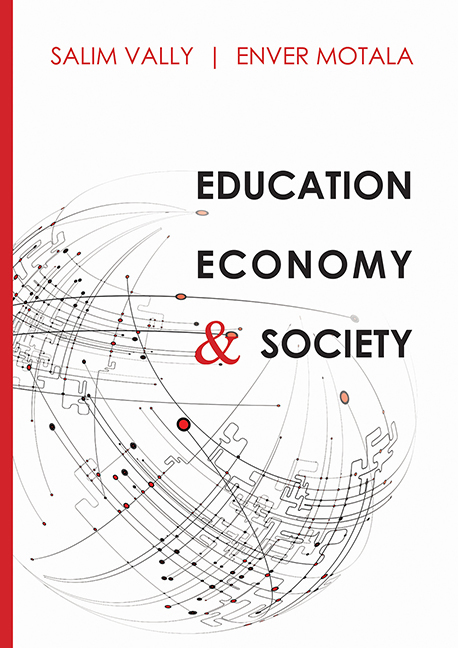Book contents
- Frontmatter
- Contents
- Foreword
- Preface
- About the contributors
- Acknowledgements
- Abbreviations and acronyms
- Chapter 1 ‘NO ONE TO BLAME BUT THEMSELVES’: Rethinking the Relationship between Education, Skills and Employment
- Chapter 2 EDUCATION AND ECONOMY: Demystifying the Skills Discourse
- Chapter 3 UNIVERSITIES AND THE ‘KNOWLEDGE ECONOMY’
- Chapter 4 GOING AROUND IN CIRCLES: Employability, Responsiveness, and the Reform of the College Sector
- Chapter 5 BUILDING A TRANSFORMATIVE PEDAGOGY in Vocational Education
- Chapter 6 SKILLS? WHAT SKILLS? JOBS? WHAT JOBS? An Overview of Research into Education/Labour Market Relationships
- Chapter 7 DEBATING THE NEXUS of Education, Skills and Technology in the Age of Lean Production: A Case Study of the ArcelorMittal Vanderbijlpark Plant
- Chapter 8 SKILLS, JOBS AND DECEPTION: Examples from the South African Workplace
- Chapter 9 ON THE USE AND ABUSE OF EDUCATION: Reflections on Unemployment, the ‘Skills Gap’ and ‘Zombie Economics’
- Chapter 10 THE YOUTH WAGE SUBSIDY in South Africa: Employment, Skills and ‘Churning’
- Chapter 11 EPISTEMIC INJUSTICE and the Struggle for Recognition: Human Dignity and the Recognition of Prior Learning
- Chapter 12 (RE)CLAIMING WORKERS' EDUCATION
- Chapter 13 SKILLS DEVELOPMENT in Post-Apartheid South Africa: Issues, Arguments and Contestations
- Index
Chapter 11 - EPISTEMIC INJUSTICE and the Struggle for Recognition: Human Dignity and the Recognition of Prior Learning
Published online by Cambridge University Press: 16 February 2020
- Frontmatter
- Contents
- Foreword
- Preface
- About the contributors
- Acknowledgements
- Abbreviations and acronyms
- Chapter 1 ‘NO ONE TO BLAME BUT THEMSELVES’: Rethinking the Relationship between Education, Skills and Employment
- Chapter 2 EDUCATION AND ECONOMY: Demystifying the Skills Discourse
- Chapter 3 UNIVERSITIES AND THE ‘KNOWLEDGE ECONOMY’
- Chapter 4 GOING AROUND IN CIRCLES: Employability, Responsiveness, and the Reform of the College Sector
- Chapter 5 BUILDING A TRANSFORMATIVE PEDAGOGY in Vocational Education
- Chapter 6 SKILLS? WHAT SKILLS? JOBS? WHAT JOBS? An Overview of Research into Education/Labour Market Relationships
- Chapter 7 DEBATING THE NEXUS of Education, Skills and Technology in the Age of Lean Production: A Case Study of the ArcelorMittal Vanderbijlpark Plant
- Chapter 8 SKILLS, JOBS AND DECEPTION: Examples from the South African Workplace
- Chapter 9 ON THE USE AND ABUSE OF EDUCATION: Reflections on Unemployment, the ‘Skills Gap’ and ‘Zombie Economics’
- Chapter 10 THE YOUTH WAGE SUBSIDY in South Africa: Employment, Skills and ‘Churning’
- Chapter 11 EPISTEMIC INJUSTICE and the Struggle for Recognition: Human Dignity and the Recognition of Prior Learning
- Chapter 12 (RE)CLAIMING WORKERS' EDUCATION
- Chapter 13 SKILLS DEVELOPMENT in Post-Apartheid South Africa: Issues, Arguments and Contestations
- Index
Summary
It is an essential attribute of personhood to be able to participate in the spread of knowledge … and to enjoy the respect enshrined in the proper relations of trust that are its prerequisite
— Iris Marion YoungThe master's tools will never demolish the master's house
— Audre LordeIntroduction
The recognition of prior learning (RPL) has been a vehicle for assessing the informally gained experiential learning of workers in many countries in the world (Evans 2000; Michelson & Mandell 2004). Approaches have ranged from the liberal humanist cultivating of self-knowledge and self-affirmation to the instrumentalist testing of workers against the needs of global capital, with the common denominator being a focus, humanistic or technicist as the case may be, on the atomised individual.
The introduction of RPL to South Africa held out the promise of a different approach, namely, the use of RPL as a mechanism for collective social and economic redress. Recognition of prior learning was intended to affirm workers’ knowledge by recognising broad equivalencies between informally and formally gained expertise, eliminating ‘artificial hierarchies’ of prestige (DoE 1995:2,5) and creating parity of esteem among unequally valued communities of knowledge and practice. The expectation was that RPL would ‘open doors of opportunity for people whose academic or career paths [had] been needlessly blocked because their prior learning… [had] not been assessed and certified’ (ibid). This, in turn, would ‘facilitate access… mobility and progression’ and thus ‘accelerate the redress of past unfair discrimination’ (ibid:2,2). While this rhetoric tellingly stressed mobility for individuals, it also reflected a sense that workers as a whole, and black workers in particular, might be affirmed in their human dignity and economic rights by RPL.
Indeed, within the union movement whose vision RPL originally was in South Africa, the ability of RPL to serve both individual and collective ends appeared to be taken for granted. It can be used to redress past imbalances by recognising skills gained in working life and by assisting to develop a culture of learning.
• At the level of the society as a whole, RPL aims to build capacity so that workers feel part of and can contribute to the broader economic and community environment.
• At the level of the workplace, RPL can be part of affirmative action initiatives, as it seeks to redress the imbalances of past injustices in education and promotion in the workplace.
- Type
- Chapter
- Information
- Education, Economy & Society , pp. 213 - 229Publisher: University of South AfricaPrint publication year: 2014



